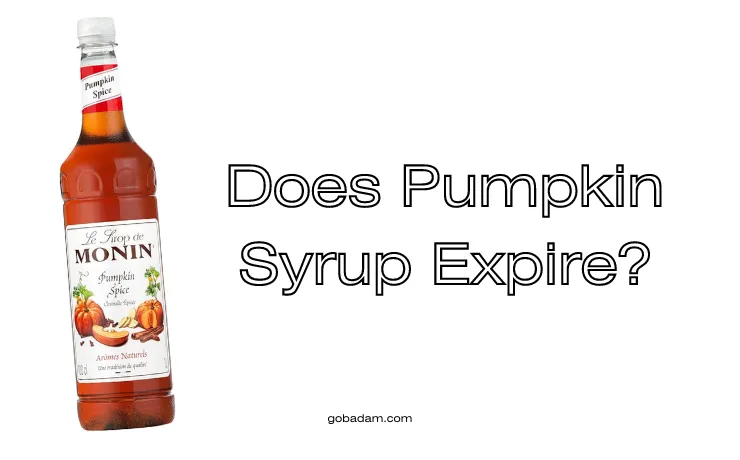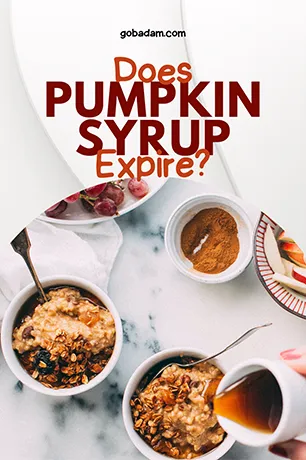Does Pumpkin Syrup Expire? Ah, who else loves the cozy feeling of wrapping up in a blanket with a pumpkin spice latte in hand? The magic, my friends, is often in that little bottle of pumpkin syrup.
But here’s a question that hit me last fall as I was doing some pantry cleaning: how long does this liquid gold last? If you’ve got a forgotten bottle lurking in the back of your cupboard, you’re probably asking the same thing. Don’t worry, I’ve got you covered! Let’s dive into the nitty-gritty of pumpkin syrup’s shelf life and more.
👉 If you still have doubts about pumpkin syrup, you can buy a new one here at a cheap price.
Pumpkin Syrup Expire Date
Does Pumpkin Syrup expire? Yes, pumpkin syrup expires in 12-18 months. After this date, the taste, texture, and overall quality of the pumpkin syrup decreases.
Now that we’ve gotten that burning question out of the way, let’s dive into some details. If you’re a pumpkin spice enthusiast like me, pumpkin syrup is the secret sauce that transforms ordinary drinks and dishes into fall magic. But like all good things, it doesn’t last forever.
Your pumpkin syrup will usually come with a “best before” or “use by” label on the bottle. This indicates the manufacturer’s date by which the syrup can be consumed in good quality and safe to consume.
Commercial brands that use preservatives may have a longer shelf life, but if you prefer all-natural, your syrup may not last as long.
The shelf life of pumpkin syrup is uncertain; may vary depending on a number of factors, including ingredients and preservatives used. So, when you’re shopping, take a moment to look beyond the price tag and check the ingredients list.
Finally: storage is everything! Even though the expiration date seems like a lifetime, improper storage can cause premature spoilage. In other words, keep the bottle in a cool, dark place and always make sure the cap is tightly closed. Don’t make the rookie mistake of storing it near a sunny window or not sealing it properly.
This recommendation is for all syrup groups. You may also be interested in our article does glucose syrup expire?
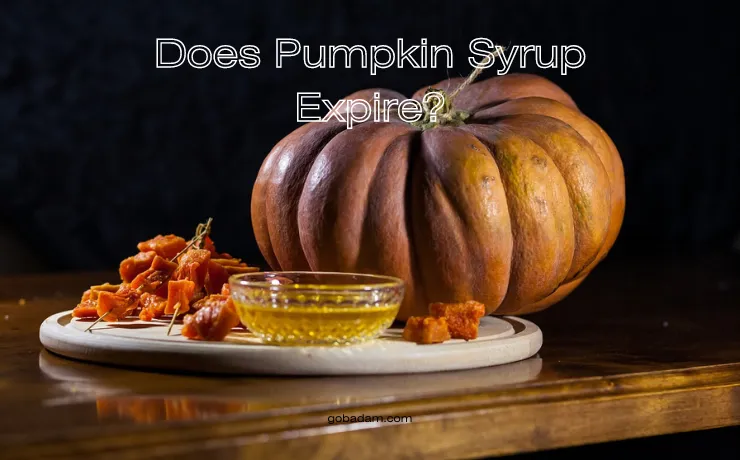
Does Opened Pumpkin Syrup Expire?
Oh, yes! The moment you crack open that bottle, the expiration clock starts ticking a bit faster. Typically, an opened bottle of pumpkin syrup will last between 6-9 months if you store it correctly.
Does Unopened Pumpkin Syrup Expire?
In a word, yes. Even if that bottle is sealed, it’s not going to last forever. However, unopened pumpkin syrup can enjoy a relatively long shelf life usually between 12-18 months if stored in the right conditions. So, if you find a sale and want to stock up, go for it! Just make sure you have the pantry space to store it properly.
How Long Does Pumpkin Syrup Last?
When it comes to the shelf life of pumpkin syrup, several factors come into play—like whether the bottle is opened or unopened, how it’s stored, and even if it’s a homemade version.
We’ve made it super easy for you by breaking down the details into a handy table. From the longevity of an unopened bottle stashed away in your pantry to the short but sweet life of a homemade concoction, here’s what you need to know:
| Condition | Shelf Life | Additional Notes |
|---|---|---|
| Unopened, Pantry | 12-18 months | Store in a cool, dark place |
| Opened, Pantry | 1-2 months | Not recommended; refrigerate for longer life |
| Opened, Refrigerated | 6-9 months | Always use a clean spoon to avoid contamination |
| Homemade | 2-4 weeks | Refrigeration is mandatory; lacks commercial preservatives |
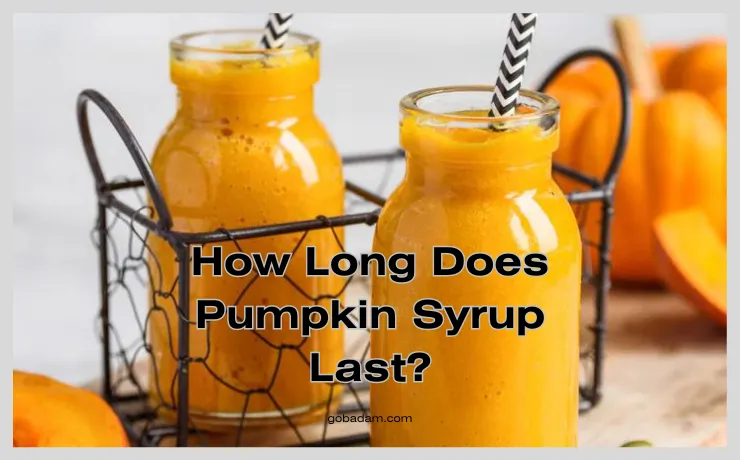
Does Pumpkin Syrup Go Bad?
The short answer is yes, pumpkin syrup can go bad. Do you know that delectable scent of pumpkin and spices that make your latte feel like a warm hug? Well, if that aroma turns sour or just plain strange, you’re likely dealing with spoiled syrup. But smell isn’t the only telltale sign; there are several ways to identify if your pumpkin syrup has crossed over to the dark side.
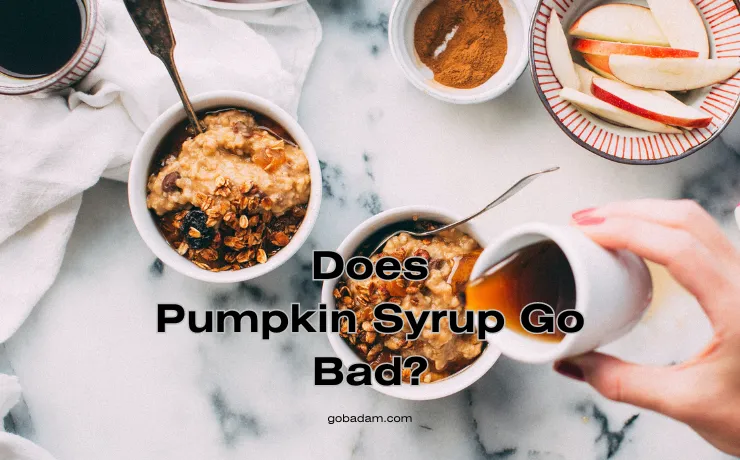
The Warning Signs
- Off-Smell: A sour or musty odor is a red flag. Good pumpkin syrup will have a pleasant, sweet aroma that’s a bit like pumpkin pie.
- Mold: Yep, those fuzzy green or white spots are not a good look for your syrup—or anything, for that matter.
- Change in Texture: If your syrup has thickened significantly, or if you see chunks or particles floating around, it’s time to let it go.
- Discoloration: While color changes can be subtle, they’re usually a sign that the syrup is past its prime.
Why Does Pumpkin Syrup Go Bad?
It’s mostly down to the ingredients. Pumpkin syrup often contains sugar and water, two elements that bacteria love. Once the bottle is opened, airborne bacteria can enter, and the syrup becomes a playground for bacterial growth if not stored correctly. Even unopened bottles aren’t entirely safe, as improper storage conditions can still lead to spoilage.
If you like syrup, our article does Torani syrup go bad, and does Elderberry Syrup Go Bad may interest you.
The Role of Preservatives
Commercially produced pumpkin syrups typically contain preservatives that extend their shelf life. But remember, even with preservatives, there’s a limit to how long they can maintain quality and safety. For natural or homemade syrups that lack these preservatives, the risk of spoilage is higher and occurs more quickly.
So yes, pumpkin syrup does go bad, but proper storage and regular checks for signs of spoilage can help you get the most out of this seasonal delight.
Pumpkin Syrup Shelf Life
So, you’ve gone a bit overboard and stocked up on more pumpkin syrup than you can realistically use in a few weeks. Don’t worry; you’re not alone! Understanding the shelf life of pumpkin syrup can help you make the most out of your autumnal stockpile.
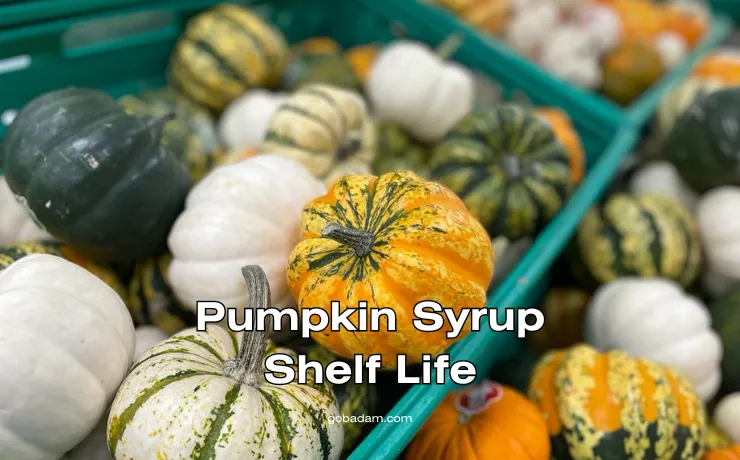
Does Pumpkin Syrup Go Bad if Not Refrigerated?
The question of refrigeration can often lead to a bit of confusion. Let me set the record straight: An unopened bottle of pumpkin syrup can certainly sit comfortably in your pantry for a while. However, keeping it in the fridge can extend that shelf life even further. So, while it’s not a strict requirement for unopened bottles, it is a good idea if you have the space.
Now, once that bottle is opened, the fridge is your best friend. The cool temperatures slow down the spoilage process, helping you get more bang for your buck.
How Long Does Pumpkin Syrup Last in the Refrigerator?
If you’ve decided to refrigerate your opened pumpkin syrup (which you should), it can last a good 6-9 months in there. But let’s throw in a little asterisk here: the longevity can be influenced by the specific product and ingredients. Some syrups with natural preservatives may even last longer, while organic, preservative-free options may have a shorter fridge life.
The Ideal Storage Conditions
When it comes to preserving the deliciousness of your pumpkin syrup, temperature is just one piece of the puzzle. Storing the bottle in a dark place can also help prolong its life. Exposure to light can speed up the degradation process, so a dark pantry or cupboard can be almost as good as a fridge for an unopened bottle.
Extra Tips for Longer Shelf Life
- Always Use Clean Utensils: Introducing bacteria from a used spoon can speed up spoilage.
- Check for Signs of Spoilage Regularly: A quick smell or visual inspection can prevent unfortunate culinary mishaps.
- Keep the Lid Tightly Sealed: An unsealed bottle can become a breeding ground for bacteria.
By understanding the shelf life and proper storage conditions, you can ensure that your pumpkin syrup remains a delicious and safe addition to your culinary endeavors for as long as possible.
What Happens If You Consume Expired Pumpkin Syrup?
Consuming expired pumpkin syrup is not recommended. While it might not be immediately harmful, spoiled syrup can contain bacteria or molds that could cause food poisoning. Symptoms can include nausea, vomiting, or diarrhea.
If you have consumed pumpkin syrup that has gone bad and you are experiencing these symptoms, you should consult a doctor immediately.
Pumpkin Syrup Expire Date FAQ
Does pumpkin syrup expire?
Yes, pumpkin syrup does expire. The shelf life for unopened bottles is generally 12-18 months when stored properly.
How can I find the expiration date of my pumpkin syrup?
Most commercial pumpkin syrups have a “best before” or “use-by” date printed on the bottle, which serves as a guide for optimal quality.
What happens if I use pumpkin syrup past its expiration date?
Using expired pumpkin syrup may result in a suboptimal flavor experience and could pose a risk of foodborne illness, especially if there are signs of spoilage like mold or off-odors.
Does opened pumpkin syrup expire faster than unopened pumpkin syrup?
Yes, once opened, the shelf life of pumpkin syrup decreases. It generally lasts for about 6-9 months in the refrigerator.
What are the signs that pumpkin syrup has gone bad?
Signs of spoilage include an off-smell, the presence of mold, and a change in texture or color.
Can I get sick from consuming spoiled pumpkin syrup?
While it’s relatively rare, consuming spoiled pumpkin syrup can pose a risk of foodborne illnesses, including symptoms like nausea and stomach upset.
Why does pumpkin syrup go bad?
Pumpkin syrup can go bad due to factors like exposure to bacteria, improper storage conditions, and the natural degradation of its ingredients over time.
Does pumpkin syrup need to be refrigerated?
While unopened pumpkin syrup doesn’t strictly require refrigeration, keeping it in the fridge can extend its shelf life. Once opened, it is recommended to store it in the refrigerator.
Can I extend the shelf life of pumpkin syrup?
The shelf life of pumpkin syrup can be extended by proper storage, such as keeping it in a cool, dark place, and always using clean utensils to avoid contamination.
How long does homemade pumpkin syrup last?
Homemade pumpkin syrup usually lasts for 2-4 weeks in the refrigerator, as it lacks the commercial preservatives that extend the shelf life of store-bought versions.

